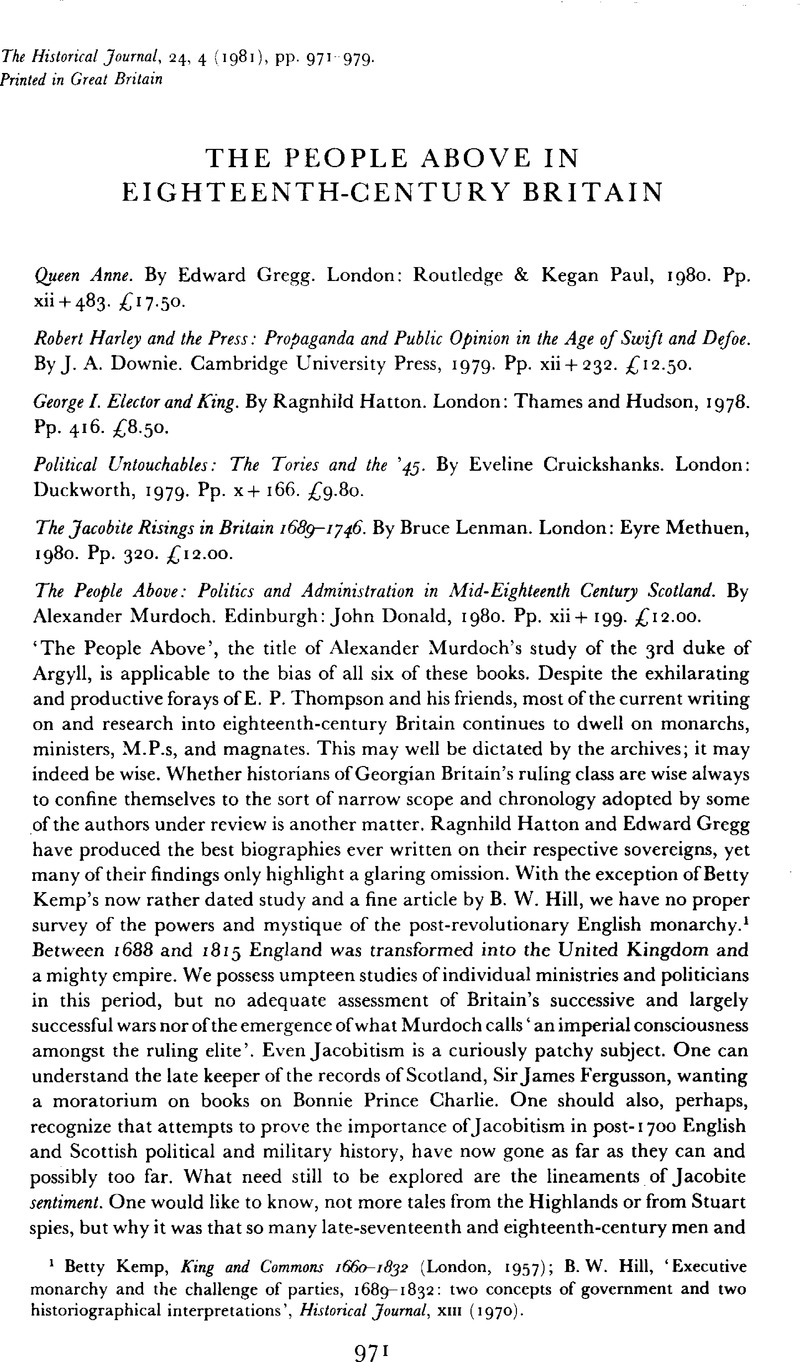No CrossRef data available.
Published online by Cambridge University Press: 11 February 2009

1 Kemp, Betty, King and Commons 1660–1832 (London, 1957)Google Scholar; Hill, B. W., ‘Executive monarchy and the challenge of parties, 1689–1832: two concepts of government and two historiographical interpretations’, Historical Journal, xiii (1970).Google Scholar
2 This problem should be partly resolved by my research student, Paul Chapman of Gonville and Caius College, who is working on eighteenth-century jacobite ideology, and by the doctoral researches of Paul Monod of Yale University.
3 Esher's comment is quoted by Donaldson, Frances, Edward VIII (London, 1974), p. 114Google Scholar. Ashley, Maurice, ‘Bridging the gap’, Encounter, XL (1973), 79.Google Scholar
4 Gregg, Queen Anne, p. 149. See also his ‘Was Queen Anne a Jacobite ?’, History, LVII (1972), and his ‘The Protestant succession in international politics,1710–16’(Ph.D. dissertation, University of London, 1972).
5 Coleman, D. C., ‘Politics and economics in the age of Anne: the case of the Anglo-French trade treaty of 1713’ in Trade, government and economy in pre-industrial England: essays presented to F.J. Fisher, eds. Coleman, D. C. and John, A. H. (London, 1976)Google Scholar; Brooks, Colin, ‘Taxation, finance and public opinion, 1688–1714’ (Ph.D. dissertation, Cambridge University, 1971)Google Scholar, and his ‘Public finance and political stability: the administration of the Land Tax, 1688–1720’, Historical Journal, XVII (1974)Google Scholar; Hill, B. W., ‘The change of government and the loss of the City, 1710–11’, Economic History Review, xxiv (1971)Google Scholar; Holmes, Geoffrey, ‘The achievement of stability: the social context of politics from the 1680s to the age of Walpole’ in The whig ascendancy: colloquies on Hanoverian England, ed. Cannon, John (London, 1981).Google Scholar
6 Against de Saussure's observation should be set that of William Cobbett on his father, an educated farmer: ‘As to politics, we were like the rest of the country people in England; that is to say, we neither knew nor thought anything about the matter… I do not remember ever having seen a newspaper in the house’, The autobiography of William Cobbett, ed. Reitzel, William (London, 1947), p. 12. This was in Surrey in the Wilkite 1760s!.Google Scholar
7 R. M. Hatton, ‘Biography by non-professional historians’, European Studies Review, 1974.
8 See also Hatton's survey of the source material for George I,’ In search of an elusive ruler’ in Fürst, Bürger, Mensch, eds. Friedrich Engel-Janosi, Grete Klingenstein, and Heinrich Lutz (Vienna, 1975).
9 Jubb, M. J., ‘Fiscal policy in England in the 1720s and 1730s’ (Ph.D dissertation, Cambridge University, 1978), p. 4.Google Scholar
10 See Baskerville, Stephen, ‘The management of the tory interest in Lancashire and Cheshire, 1714–47’ (D.Phil dissertation, Oxford University, 1976), pp. 74 ff.Google Scholar
11 It is sometimes difficult to decide how far London consciously followed a policy of salutary neglect in Scotland, and how far it was merely inept. See, for example, the evidence in Carmichael, E. K., ‘Jacobitism in the Scottish commission of the peace, 1707–60’, Scottish Historical Review, LVIII (1979).Google Scholar
12 Cf. Levack, Brian, ‘Towards a more perfect Union’, After the Reformation: essays in honor of J. H. Hexter, ed. Barbara C., Malament (Pennsylvania, 1980).Google Scholar
13 For this improvement in Scottish landed incomes, see Smout, T. C., ‘Scottish landowners and economic growth 1650–1850’, Scottish Journal of Political Economy, xi (1964)Google Scholar, and for its temporal reward, Michael McCahill, W., ‘The Scottish peerage and the House of Lords in the late eighteenth century’, Scottish Historical Review, LI (1972), and his’ Peerage creations and the changing character of the British nobility,1750–1830’, English Historical Review, xcvi(1981).Google Scholar